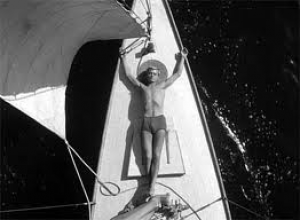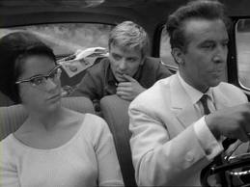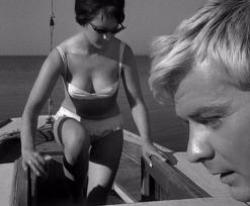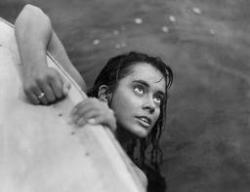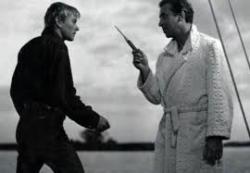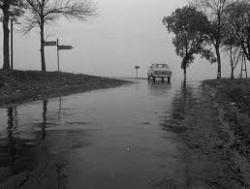Polanski's sharp debut
By Michael Roberts
Roman Polanski made one of the most self-assured and stylish debuts in the history of cinema with his 1962 feature, 'Knife in the Water', and simultaneously announced himself as a major directorial talent. Polanski, a survivor of the brutal wartime Warsaw ghetto, started in showbiz as an actor before moving into directing short films in Poland. Polanski cast two actors with very little experience in the roles of the young woman and man, and in the older man role of Andrzej, he cast established actor Leon Niemczyk. Polanski and Jerzi Skolimowski, co-authored the taut three-character script, and Skolimowski went on to direct himself, notably the superb 'Deep End' with Paul McCartney ex Jane Asher in 1969. The exceptional cinematography by Jerzy Lipman was an essential and integral component of the film's look and feel, and Polanski dazzles with his set up's and framing and total command of the visual medium.
Andrzej and his much younger wife Krystyna (Jolanta Umecka) are driving to a marina for an outing on their yacht. Andrzej isn't happty with the speed his wife is driving at and takes over the wheel, driving much faster. The rain comes and Andrzej turns on his wipers. A young male hitch-hiker appears in the middle of the road and forces the car to stop suddenly. Andrzej argues with the young man over the tactic of playing 'chicken', but gives him a lift to to spite his wife. At the marina the men engage in a conversation and when the boy turns to leave Andrzej summons him back with an offer to sail with the couple, "I knew you'd call me back", the young man says, "I knew you'd want to go on with the game". It's apparent Andrzej is on a power trip, trying to impress his wife with a macho display as the skipper, but as the day progresses the sky turns dark and events take a similar turn.
Polanski manages to overlay a profoundly Hitchcock like tension across the claustrophobic set up. Like Hitch, he appears to be able to take what is essentially a single set, the yacht, and make it seem dimensional and an integral part of the film's total effect. Polanski keeps in play the delicate balance between an environment that offers freedom and escape at one level, but confinement and uncomfortable intimacy at another. The psycho-sexual tension builds as the game that is being played between the two men inevitably brings Krystyna into it's orbit, and she represents a prize, a possession just like the yacht. Andrzej is a man who wants 'status', and his young trophy wife is plainly another collectable piece, something to own and protect. They 'old bull versus young bull' scenario is muddied somewhat by the obvious homo-erotic dimension Polanski hints at, and it's no surprise that in the evening they listen to a heavyweight title fight on the radio while playing a game of 'pick up sticks'.
Krystyna knows her place in the scheme of things, she also knows that the young man envies the possessions of Andrzej, and eventually she manipulates events that give her some control over the situation. She asks, "Why did you bring him along?" to Andrzej, but the sense is she knew the answer, and was used to blustering shows of bravado from her insecure husband. When the couple fight at one point and Andrzejs says to his wife "without me you're a whore", it exposes the stark patriarchal sexual politics of the era. After Andrzej leaves the boat she tells the young man, "you're just like him". She remains so unsure of how her husband will react to the percieved fate of the young man that she doesn't know if he will go to the police and report a death, or merely the theft of his car's wipers. The wipers are a metaphor for his futile attachment to possessions, his lack of judgement and to his tendency to go too far, like bragging that he didn't need to take them off the car earlier as they would not be stolen at the marina. Andrzej is faking his confidence, living an empty life and covering up that emptiness by 'owning' stuff, unable to find true worth in connecting with his wife.
'Knife In The Water' is a visual treat, stunning to look at and endlessly inventive in it's composition and framing, beautifully crisp, elegant and clean. Polanski proved himself capable of injecting an understated aura of dread into proceedings, and created a memorable and mesmerising film in the process. Roman Polanski went to England after the international success of 'Knife In The Water', and proceeded to make three very fine films there before being lured to Hollywood by Robert Evans. As a debut feature it ranks with the very best, particulary the contemporary efforts of Louis Malle and Francios Truffaut in 'Elevator to the Scaffold' and 'The 400 Blows' respectively.
